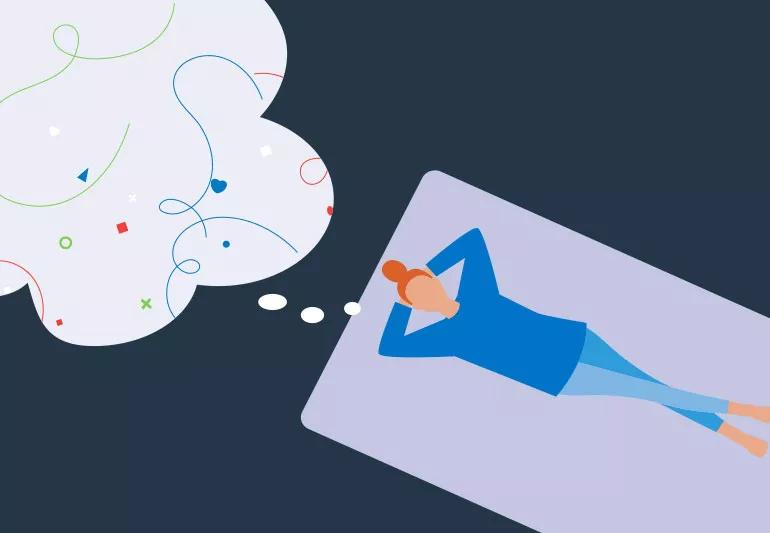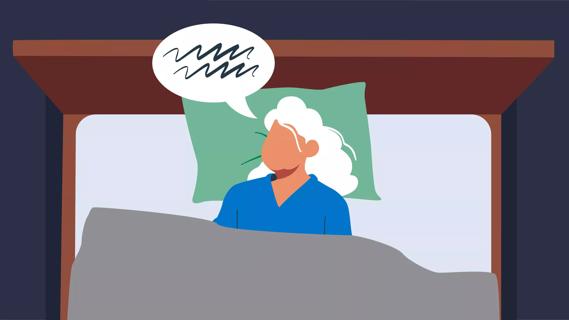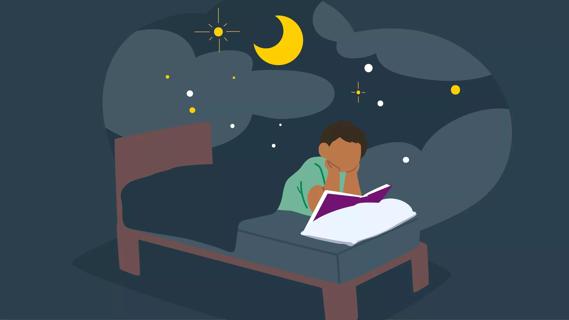Advertisement
This bedtime exercise can help you fall asleep faster (and stay asleep)

Turning off your brain before bed can be more difficult than we think. From the desire to scroll social media to dealing with daily work and family stress, the road to slumber town can have many bumps along the way.
If you’re having trouble drifting off, you’re definitely not alone. “Up to a third of adults, at some point in time, have trouble with sleep and insomnia,” says functional medicine specialist Melissa Young, MD. Meditation is an excellent tactic for calming your mind and priming your body for sleep.
Advertisement
Cleveland Clinic is a non-profit academic medical center. Advertising on our site helps support our mission. We do not endorse non-Cleveland Clinic products or services. Policy
Dr. Young explains what sleep meditation is, how it works and its many benefits.
Sleep meditation is a practice that helps prepare your body and mind for sleep. Especially if you have anxiety or insomnia, it can be hard to just jump into bed and fall asleep as soon as your head hits the pillow. According to Dr. Young, stress, pain and anxiety are the most common factors that can interrupt our sleep and keep us awake at night.
So, think of it as a wind-down button that preps your body and mind for a sleep state through mindful exercises that specifically focus on relaxing your body and mind.
“All of this helps our body and mind move into a more relaxed state, making it easier to transition to sleep,” says Dr. Young.
Some examples of sleep meditations tools include:
Advertisement
If meditation is completely new to you, it might feel a bit overwhelming to know where to start. That’s why it’s good to consider guided meditation if you need a blueprint for how to get started. (Don’t worry, we’ll give you one in just a moment.)
As Dr. Young points out, there are plenty of resources on the internet, or even at your local library, that can help guide your first time meditating before bed. Try looking up “guided sleep meditation” on sites like YouTube or wherever you listen to podcasts or audiobooks.
“Over time, you can learn to do this on your own and go through a body scan or different breath techniques,” notes Dr. Young. “That way, you are actually learning to self-soothe and guide yourself into a more relaxed state with meditation.”
Whether you’re dealing with insomnia, physical pain or situational stress that’s causing you sleep issues, sleep meditation can help you find your snooze sweet spot. In the long run, this can promote better sleep, regenerate your body, and restore energy levels the next morning and throughout the day.
Making a conscious effort to calm your mind and be mindful before bed helps you actively shift your body into a parasympathetic (rest) mode. So, instead of letting yourself sit in an anxious fight-or-flight mode, sleep meditation helps counteract this by promoting a sense of calm and relaxation.
“Up to 8 to 10% of the world’s population has insomnia that qualifies as a sleep disorder. It’s very common,” Dr. Young notes. She also says that stress and anxiety are one of the biggest causes of interrupted sleep, so it’s possible that continuous sleep meditation can help with insomnia symptoms in the long run.
A 2019 review found that brief mindfulness meditation intervention may be effective in improving sleep quality and reducing symptoms of insomnia in college students.
But keep in mind, if you’re not seeing any improvement in your sleep quality after sleep meditation or other lifestyle changes, it’s important to see a healthcare provider or sleep specialist. A professional can help you explore whether you might have a medical condition like restless leg syndrome or sleep apnea that’s interfering with getting a good night’s sleep.
Sometimes, our problem is simply that our minds don’t want to shut off. Maybe it’s a particularly busy week at work or you’re worried about family troubles. Every time you almost doze off, another thought pops up: What do I have to do tomorrow? Am I prepared for the week ahead? What did I forget?
Advertisement
“I think we often start replaying the day in our mind and worrying about what we could have done better or what we didn’t do right,” says Dr. Young. “These sleep meditations can be very helpful in releasing some of those thoughts.”
These are the mind movies that keep us up at night, and sleep meditation can be a tool that can turn that film reel off by directing you to focus on your body and breathing.
Your quality of sleep definitely can impact your brain health. Your mind needs the necessary rest to recharge every night, and if it doesn’t, that can lead to some issues down the line.
“We actually have a lymphatic system in the brain that clears toxins from the brain as we sleep,” explains Dr. Young. “So, it’s even more important when we think about our brain health and the rise of neurodegenerative disorders.”
There’s no hard and fast rule of what kind of meditation before bed will work for you, so you might want to try a couple different formats and be open to exploring new things.
“It’s important to find the modality that works best for you,” says Dr. Young. “Maybe it’s just some breath work with either diaphragmatic breathing. Or maybe it’s visualizing and relaxing your muscles.”
Here’s a guide to one way you can do a sleep meditation:
Advertisement
Sleep meditation is a great tool to have under your belt when you’re trying to improve your sleep hygiene. But there are other things you can do as well. Here are some other ways to improve your sleep routine:
How you feel during the day will impact how you feel before bed. So, Dr. Young recommends taking those sleep meditation exercises (even if it’s five minutes of breathwork or meditation) and sneaking them in during little bits of your day as well.
“This actually makes it easier to get in a relaxed, calm state before bed,” she explains. “So ideally, combining some of those great techniques throughout the day is a plus.”
It’s no surprise that looking at our phones before bed can negatively impact our sleep quality. But it even goes beyond lessening your screen time, notes Dr. Young.
Advertisement
The screen light we’re exposed to throughout the day can also impact the quality of sleep we may have later that night. She recommends at least one hour before bed be phone-free and screen-free.
“Some people are more sensitive than others and might need a longer window,” she adds. “It may help to wear those blue-blocking glasses several hours before bed as well.”
Our digestive systems can play a role in our sleep quality as well. You don’t want to give your stomach too much work to do right before you’re trying to get your body into a sleeping state.
This means: Those midnight snacks you keep turning to? They may be causing more harm than you realize. Dr. Young urges trying to eat earlier in the evening as best as you can.
“Make sure you finish your dinner about three hours before bedtime so you know food is digested,” she advises.
It can be hard to focus on lulling yourself to sleep if that pesky street light right outside your window is constantly shining a spotlight on your pillow. If you’re especially sensitive to light, Dr. Young recommends taking some precautions to help envelope yourself in calming darkness before bed.
“We are surrounded by so much external light, even outside of our phone screens.” She recommends getting some blackout shades for our bedroom windows to help block out streetlights or any other outside brightness. “It can make a big difference in helping you fall asleep and stay asleep,” she adds.
Sleep meditation works best if you can combine relaxation techniques during the day and if you find a mode that works best for you. The point of meditation before bed is customizing it to what calms you down. But overall, breathwork, body scans and simply taking five to 10 minutes to focus on relaxing your body throughout the day and night can do wonders for your sweet dreams
Learn more about our editorial process.
Advertisement

While walking, be mindful of your body, your mind, your place in the world and all five of your senses as you pave a path forward, one step at a time

Sleeping with separate blankets can help you get the ZZZs you need — without fighting for covers all night

Stress, weight gain and forgetfulness are just a few effects of losing sleep

Stress, alcohol, sleep apnea and (you guessed it!) scary movies are a few common causes of bad dreams

Recording your dreams may help you become more mindful, understand your thought patterns, process your emotions and even reduce your stress

Chamomile, lavender and valerian root teas may offer a faster route to dreamland

Many factors can contribute to sleep talking, like stress or anxiety, lack of or low-quality sleep, or even more serious sleep-related conditions

A consistent, structured routine, which may include incentives, can help children learn to stay in bed and get the ZZZs they need

Focus on your body’s metabolic set point by eating healthy foods, making exercise a part of your routine and reducing stress

PFAS chemicals may make life easier — but they aren’t always so easy on the human body

While there’s little risk in trying this hair care treatment, there isn’t much science to back up the claims